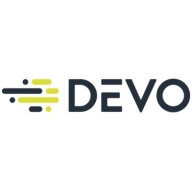

Find out what your peers are saying about Splunk, Wazuh, Microsoft and others in Security Information and Event Management (SIEM).
| Product | Market Share (%) |
|---|---|
| Devo | 1.1% |
| Panther | 0.4% |
| Other | 98.5% |

| Company Size | Count |
|---|---|
| Small Business | 7 |
| Midsize Enterprise | 4 |
| Large Enterprise | 11 |
Devo is the only cloud-native logging and security analytics platform that releases the full potential of all your data to empower bold, confident action when it matters most. Only the Devo platform delivers the powerful combination of real-time visibility, high-performance analytics, scalability, multitenancy, and low TCO crucial for monitoring and securing business operations as enterprises accelerate their shift to the cloud.
Panther is a cloud-native security analytics platform that delivers code-driven detection and response at petabyte scale, eliminating the overhead and cost associated with traditional SIEMs. It empowers organizations to turn their cloud logs into actionable security insights.
Panther leverages advanced analytics and automation to provide real-time threat detection and response. The platform’s SQL-based detection-as-code approach allows security teams to write, test, and deploy detection logic efficiently, offering unmatched flexibility and customizability. With its scalable architecture, Panther handles large volumes of data seamlessly, ensuring robust security monitoring across dynamic environments. By integrating with a wide range of data sources, Panther centralizes security event data, providing comprehensive visibility and enabling proactive threat management.
What are the critical features of Panther?
What benefits or ROI should users look for in Panther reviews?
Panther is utilized in industries such as finance, healthcare, and technology, offering industry-specific compliance and security solutions. Its scalable and flexible nature makes it suitable for organizations with complex and evolving security needs.
Pricing and licensing for Panther are usage-based, determined by data volume, offering a cost-effective model for various organizational sizes. Customer support is tiered, providing resources and assistance tailored to specific service requirements.
In summary, Panther provides a scalable, cost-efficient, and customizable security analytics solution, transforming cloud logs into actionable security insights while avoiding the overhead of traditional SIEMs.
We monitor all Security Information and Event Management (SIEM) reviews to prevent fraudulent reviews and keep review quality high. We do not post reviews by company employees or direct competitors. We validate each review for authenticity via cross-reference with LinkedIn, and personal follow-up with the reviewer when necessary.